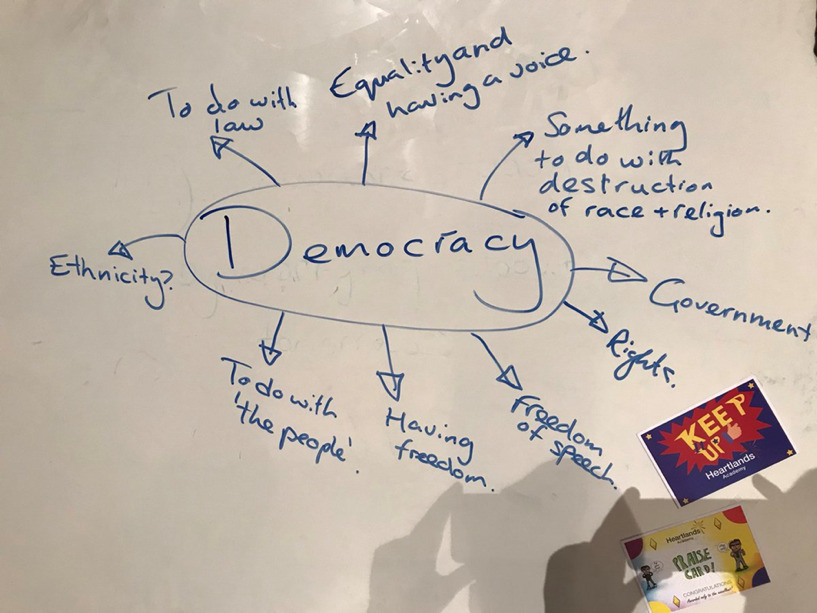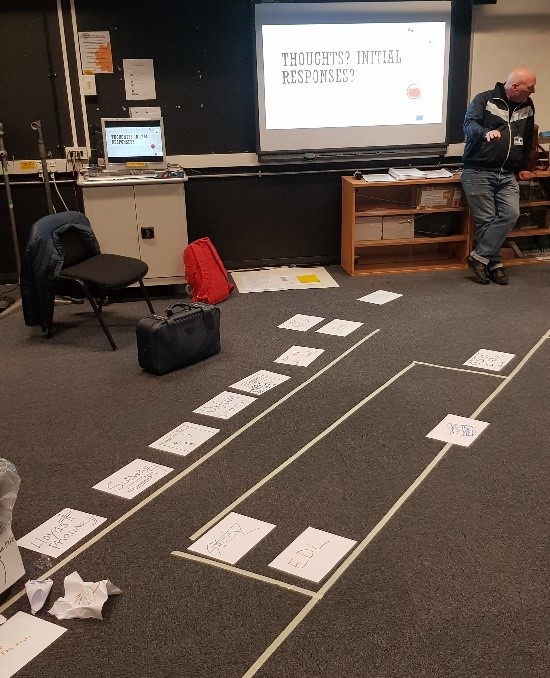Ed Lee and Orlagh Russell are two drama teachers working in Heartlands Academy, Birmingham. Here they share a recent update on how they are addressing the notion of democracy within their practice.
Heartlands Academy is an inner-city school in the Nechells area of Birmingham, England. It serves a diverse cohort of learners that come from a range of ethnic backgrounds. Over 80% of the learners speak English as an additional language. This workshop was run in a single lesson with a group of year 8 learners.

At Heartlands Academy we have worked hard to develop a drama department where exploration of issues is as important as performance. We have strong links with the Humanities and Languages departments which, with the guidance of the drama team, have embraced the use of dramatic techniques as a tool for deepening the learning in their classrooms.
As part of this project we have been looking at Democracy from two particular perspectives:
- Using dramatic techniques to assist learners in developing a deeper understanding of democracy through dramatic inquiry.
- Trying to understand how to open up a democratic process whereby learners have a chance to guide their learning.
In a bottom set year 8 class we began by asking the learners what they thought democracy was as a form of ‘baseline test’. The responses were largely accurate, however there are a few glaring discrepancies. One pupil responded “I think it is something to do with destruction of race and religion”. It is important that this misconception is included and indeed adressed. When questioned further, this pupil explained that he thought this because he had heard on the news about ‘Western democracies fighting against radical Islam’. This is a significant thought because the learner has heard the use of the word as a noun and has mistakenly united the action involved in the news story with the concept of democracy.
As such, a key tennet of the countries involved in the Demo:Dram project, I believe this example alone illustrates the need for an explicit study of the concept of Democracy with school- age children.

In the pursuit of redressing these misconceptions and building on the knowlegde that the learners already had we set about using a dramatic approach to deepen the learners’ understanding of the concept of democracy. We used what the Council of Europe define as the two key principles of democracy:
- Individual autonomy: The idea that no-one should be subject to rules which have been imposed by others. People should be able to control their own lives (within reason).
- Equality: The idea that everyone should have the same opportunity to influence the decisions that affect people in society.
We started off as a group by creating a street. As facilitator the teacher guided learners through a meditation where they picture a suburban street. The description of this street is deliberately vague. The teacher uses cues such as “I know that there are a number of houses on each side of the street… can you picture what one of the houses look like?”
The purpose of this exercise is to scaffold the learners into the fictional world that we want to create in a safe way where they have some freedom to create within given parameters of the dramatic inquiry.

Once the learners have some idea of the basic form of the street they were invited to take part in an exercise called ‘placing the text’. In this exercise we flesh out some of the detail by writing or drawing items on sticky notes and placing them in position within the space.
Co-constructively we work to map out a portion of the street. How wide is the road? Are there any cars? Is there a pavement? Do the houses have front gardens? What state are the houses in?
This process by its very nature is democratic. All learners have an equal chance to contribute to the creation of the fictional world. This is an absolutely essential part of the creation because it promotes ownership over the work and brings the created world into sharp focus.
This Fictional world is the platform on which we can transplant different issues, barriers and stories that can be explored by the learners ‘in role’. In this case the learners are not asked to create characters but are asked to inhabit their fictional world as themselves. The teacher leads the learners into inhabiting the fictional world by informing them that on the street a crime has been committed and they are gathered to debate what they can do as residents to make their street safer.
At this point the teacher starts to facilitate the learners in debate. There are some learners that naturally show a disposition for problem solving, others that put up barriers to ideas and some learners that have little to say and need to be prompted. Importantly the learners have control over the destiny of the debate. The role-play is rounded off when the teacher asks the ‘residents’ to think independently before the next time that they meet of three things that they think would help in keeping the street safe.
In further lessons the learners would start to pick apart the process of the ‘residents committee’ Following inquiry question such as: Who should be spokesperson for our group? Who can we trust to lead our committee? What are the values that we want to live by on our street?
At each step the teacher facilitating can remove the learners from the fictional world and bring the learners back to the issue of democracy and the how the learners current ideas compliment or differ from their initial ideas.
References